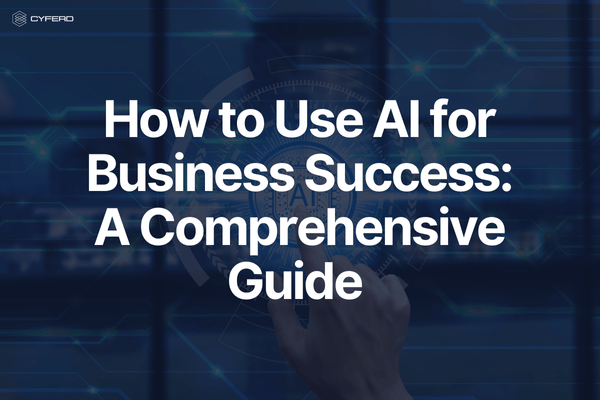AI

How to Use AI for Business Success: A Comprehensive Guide
Artificial intelligence (AI) has become an indispensable tool for businesses striving to enhance productivity, streamline operations, and make data-driven decisions. From automating mundane tasks to personalizing customer experiences, AI technology offers companies of all sizes powerful ways to overcome everyday challenges and boost efficiency. Here, we explore the various applications of AI, how to get started, and why platforms like Cyferd can be essential in driving your business forward.
Understanding AI in Business
Before diving into applications, let’s break down what AI is. In simple terms, AI refers to machines or software that mimic human intelligence to perform tasks like learning, reasoning, and problem-solving. From intelligent chatbots to advanced data analysis tools, AI can interpret and act on data at speeds far beyond human capability, giving businesses a competitive edge in the marketplace.
Key Applications of AI in Business
AI has diverse applications that span departments and functions. Below are some practical ways to leverage AI for maximum impact.
- Automating Routine Tasks: One of AI’s most valuable capabilities is automation. Repetitive tasks, such as data entry, scheduling, and invoice processing, can be managed seamlessly by AI tools, freeing up time for your team to focus on strategy and innovation. Automated workflows lead to increased productivity and cost savings, ensuring employees spend more time on high-value activities.
- Enhancing Customer Support: AI-powered chatbots are a game-changer in customer support, available 24/7 to respond instantly to common inquiries. Not only do they reduce wait times, but they also analyze customer interactions to offer tailored solutions. With advanced capabilities like natural language processing, AI chatbots can detect customer emotions, anticipate needs, and escalate complex issues to human agents when necessary.
- Streamlining HR Processes: Recruitment, onboarding, and employee engagement can be enhanced through AI. By scanning resumes, assessing candidates, and filtering based on skill requirements, AI reduces hiring biases and saves time. AI also supports performance management by analyzing productivity data, allowing HR teams to make data-driven decisions about promotions, training, and workforce development.
- Data Analysis and Informed Decision-Making: One of AI’s core strengths is its ability to process large datasets quickly and accurately, providing insights that fuel better business decisions. Sales forecasting, customer feedback analysis, and real-time inventory management are just a few areas where AI-driven analytics help businesses stay agile and responsive.
- Driving Product Development:AI plays an instrumental role in product innovation by analyzing customer preferences, market demands, and competitor offerings. This allows businesses to identify gaps, make informed product improvements, and bring high-demand products to market faster. By continuously learning from customer feedback, AI facilitates a cycle of improvement that keeps products relevant and valuable.
- Optimizing Operational Efficiency: From managing supply chains to controlling inventory, AI-powered tools help businesses optimize resource allocation. For example, predictive analytics can identify trends in demand, helping companies avoid overstocking or understocking, which can be costly. AI also aids in monitoring equipment performance, reducing downtime through predictive maintenance.

Getting Started with AI: A Step-by-Step Guide
If you’re considering integrating AI into your operations, starting small and focusing on specific business needs is essential. Here are a few actionable steps to guide you:
- Identify Your Needs: Begin by analyzing your business processes and pinpointing areas where AI could make a tangible difference. AI is most impactful when it addresses specific pain points, so consider where it could relieve your team from repetitive tasks, enhance customer engagement, or boost efficiency in data management. Prioritize critical functions—such as customer service, HR, marketing, or operations—that would benefit from streamlined processes or deeper insights. A focused approach allows you to select AI solutions that address real needs, making it easier to measure the technology’s impact and secure team buy-in.
- Choose the Right Tools: With numerous AI tools available, it’s crucial to choose options that align with your business objectives and integrate across departments. Using too many disconnected or siloed tools can create “AI sprawl,” where data becomes fragmented, complicating insights and potentially increasing compliance risks. To avoid this, prioritize platforms that offer flexible, unified capabilities, allowing data to flow seamlessly across teams. Solutions like the Cyferd Platform provide an all-in-one approach, reducing the need for redundant tools and helping you maximize insights across business functions.
- Test and Iterate: Instead of deploying AI solutions on a large scale from the get-go, start small and scale gradually. Implement a pilot program in a selected department or task to assess AI’s effectiveness and identify any adjustments needed. Track key performance metrics like time savings, error reduction, or customer satisfaction to evaluate success. This iterative approach enables your business to gather insights, refine processes, and minimize risks. Adapting based on real-world results allows you to optimize the AI tool, ensuring it aligns well with your team’s workflows and goals before a full-scale rollout.
- Train Your Team: A successful AI implementation requires a team that understands how to utilize these tools effectively. Invest in training sessions to familiarize employees with new AI technologies, whether that involves handling automated processes, interpreting AI-generated insights, or understanding data privacy requirements. Offering ongoing resources—like tutorials, help documentation, or hands-on workshops—ensures employees feel confident and capable. Proper training maximizes AI’s benefits, fosters a culture of technological literacy, and helps employees become advocates for AI, driving innovation within your organization.
FAQs on Using AI for Business
What is AI used for in business?
AI serves a wide range of business functions, automating repetitive tasks, enhancing customer service, and offering data-driven insights to improve decision-making. In customer support, AI-powered chatbots handle inquiries 24/7, providing instant responses and personalizing interactions. HR departments use AI to streamline recruitment by scanning resumes and identifying top candidates quickly, reducing time and hiring bias. For operations, AI optimizes resource management, predicts demand, and improves supply chain efficiency. Ultimately, AI’s versatility makes it a powerful tool for transforming multiple areas of a business, increasing efficiency, and enhancing customer and employee satisfaction.
How can SMEs and enterprises benefit from AI?
For both SMEs and large enterprises, AI provides valuable opportunities to streamline operations and fuel growth. SMEs can harness AI to automate time-consuming tasks, like scheduling and data entry, allowing employees to focus on higher-value work and reduce operational costs. AI-driven customer service tools help SMEs deliver high-quality support, improving customer satisfaction without needing a large team. For enterprises, AI assists in managing vast datasets and uncovering insights, from improving supply chain logistics to predicting market trends, which are crucial for staying competitive. Enterprises can leverage AI across departments to coordinate complex operations, optimize processes, and enable data-driven decision-making at scale. Both SMEs and large companies can therefore use AI to increase productivity, cut costs, and make smarter, faster decisions in a fast-paced market.
Do I need technical skills to use AI in my business?
While some AI tools may require technical knowledge, many modern platforms are designed to be accessible for users without coding or advanced tech skills. User-friendly interfaces and built-in guidance make it easy for anyone to start using AI, from customer service chatbots to basic data analytics tools. Many providers also offer training resources—like tutorials, webinars, and hands-on workshops—to help users and their teams quickly become proficient. For businesses that require more complex AI solutions, partnering with a vendor or working with an in-house IT team can provide the support needed to customize and integrate AI effectively. So, while technical expertise can enhance the use of advanced AI tools, it’s often not necessary for everyday applications, making AI accessible for teams across skill levels.

Why Choose Cyferd and Neural Genesis?
Cyferd’s AI, Neural Genesis, is designed to revolutionize business operations by simplifying complex processes and empowering better decision-making. Built into Cyferd’s composable workflows, Neural Genesis enables users to effortlessly integrate advanced Ai capabilities into their operations. With an intuitive drag-and-drop interface, Cyferd makes it simple to incorporate Neural Genesis functionality into your processes – no technical expertise required.
Whether you need to streamline decision-making, manage data effectively, or improve operation efficiency, Neural Genesis adapts to yur needs, helping you build workflows that evolve with your business. Here’s how Neural Genesis delivers value across you organization:
- Comparison: Neural Genesis enables users to make effective decisions by providing comparative and contextual insights. This helps you understand data in a more nuanced way, making it easier to weigh options and make data-driven decisions.
- Prioritisation: By prioritizing tasks and resources, Neural Genesis guides users to allocate their efforts and limited resources to achieve the best possible outcomes, maximizing efficiency and impact.
- Severity Assessment: Neural Genesis takes a big-picture approach, assessing the broader impact of potential actions. This capability helps you evaluate the severity of issues or projects, ensuring strategic alignment and effective risk management.
- Redaction and Obfuscation: Compliance is made simpler with Neural Genesis, which systematically redacts (blanks out) or obfuscates (masks) sensitive data, helping you meet complex regulatory requirements with ease.
- Sentiment Analysis: Neural Genesis goes beyond surface-level information, analyzing text to uncover underlying sentiment. This allows your business to gauge customer emotions, improve engagement, and respond more effectively.
- Summarisation: Neural Genesis quickly distills lengthy documents, summarizing key information to save time and enhance productivity. It’s an invaluable tool for users needing concise, actionable insights.
- Content Generation: From document creation to crafting relevant prompts, Neural Genesis generates high-quality content tailored to your business needs, streamlining workflows and boosting productivity.
- Prediction: Neural Genesis democratizes data science, allowing users of all skill levels to predict likely future outcomes based on available data. This makes proactive planning and forecasting accessible across teams.
- Structuring Unstructured Data: Unstructured data is often difficult to manage, but Neural Genesis provides structure and control, unlocking the value in important data assets and making them actionable.
- Tagging and Enrichment: With Neural Genesis, data can be enriched through tagging and descriptive elements, making it easier to find, categorize, and use data for broader purposes.
- Categorisation: Neural Genesis automatically categorizes data sets, giving you enhanced visibility and control over your information, helping you stay organized and efficient.
With Neural Genesis, Cyferd equips businesses with AI-driven tools to tackle today’s challenges, making it a trusted choice for companies seeking to leverage data intelligently and improve their operations.
Conclusion: Embrace AI for Business Growth
Incorporating AI into your business isn’t just about adopting a trend—it’s about transforming how you operate to increase productivity, improve customer satisfaction, and make informed decisions. As the business landscape grows more competitive, AI can provide the tools and insights needed to stay ahead. Start exploring AI solutions today, and see how they can drive your organization toward success.
By partnering with an innovative platform like Cyferd, you can unlock AI’s full potential and give your business the flexibility to evolve with emerging technologies. Don’t wait—embrace AI now to create a smarter, more efficient organization poised for growth.
Find out more About Cyferd
New York
Americas Tower
1177 6th Avenue
5th Floor
New York
NY 10036
London
2nd Floor,
Berkeley Square House,
Berkeley Square,
London W1J 6BD
Request a Demo
Comparisons

BOAT Platform Comparison 2026
Timelines and pricing vary significantly based on scope, governance, and integration complexity.
What Is a BOAT Platform?
Business Orchestration and Automation Technology (BOAT) platforms coordinate end-to-end workflows across teams, systems, and decisions.
Unlike RPA, BPM, or point automation tools, BOAT platforms:
- Orchestrate cross-functional processes
- Integrate operational systems and data
- Embed AI-driven decision-making directly into workflows
BOAT platforms focus on how work flows across the enterprise, not just how individual tasks are automated.
Why Many Automation Initiatives Fail
Most automation programs fail due to architectural fragmentation, not poor tools.
Common challenges include:
- Siloed workflows optimised locally, not end-to-end
- Data spread across disconnected platforms
- AI added after processes are already fixed
- High coordination overhead between tools
BOAT platforms address this by aligning orchestration, automation, data, and AI within a single operational model, improving ROI and adaptability.
Enterprise BOAT Platform Comparison
Appian
Strengths
Well established in regulated industries, strong compliance, governance, and BPMN/DMN modeling. Mature partner ecosystem and support for low-code and professional development.
Considerations
9–18 month implementations, often supported by professional services. Adapting processes post-deployment can be slower in dynamic environments.
Best for
BPM-led organizations with formal governance and regulatory requirements.
Questions to ask Appian:
- How can we accelerate time to production while maintaining governance and compliance?
- What is the balance between professional services and internal capability building?
- How flexible is the platform when processes evolve unexpectedly?
Cyferd
Strengths
Built on a single, unified architecture combining workflow, automation, data, and AI. Reduces coordination overhead and enables true end-to-end orchestration. Embedded AI and automation support incremental modernization without locking decisions early. Transparent pricing and faster deployment cycles.
Considerations
Smaller ecosystem than legacy platforms; integration catalog continues to grow. Benefits from clear business ownership and process clarity.
Best for
Organizations reducing tool sprawl, modernizing incrementally, and maintaining flexibility as systems and processes evolve.
Questions to ask Cyferd:
- How does your integration catalog align with our existing systems and workflows?
- What is the typical timeline from engagement to production for an organization of our size and complexity?
- How do you support scaling adoption across multiple business units or geographies?
IBM Automation Suite
Strengths
Extensive automation and AI capabilities, strong hybrid and mainframe support, enterprise-grade security, deep architectural expertise.
Considerations
Multiple product components increase coordination effort. Planning phases can extend time to value; total cost includes licenses and services.
Best for
Global enterprises with complex hybrid infrastructure and deep IBM investments.
Questions to ask IBM:
- How do the Cloud Pak components work together for end-to-end orchestration?
- What is the recommended approach for phasing implementation to accelerate time to value?
- What internal skills or external support are needed to scale the platform?
Microsoft Power Platform
Strengths
Integrates deeply with Microsoft 365, Teams, Dynamics, and Azure. Supports citizen and professional developers, large connector ecosystem.
Considerations
Capabilities spread across tools, requiring strong governance. Consumption-based pricing can be hard to forecast; visibility consolidation may require additional tools.
Best for
Microsoft-centric organizations seeking self-service automation aligned with Azure.
Questions to ask Microsoft:
- How should Power Platform deployments be governed across multiple business units?
- What is the typical cost trajectory as usage scales enterprise-wide?
- How do you handle integration with legacy or third-party systems?
Pega
Strengths
Advanced decisioning, case management, multi-channel orchestration. Strong adoption in financial services and healthcare; AI frameworks for next-best-action.
Considerations
Requires certified practitioners, long-term investment, premium pricing, and ongoing specialist involvement.
Best for
Organizations where decisioning and complex case orchestration are strategic differentiators.
Questions to ask Pega:
- How do you balance decisioning depth with deployment speed?
- What internal capabilities are needed to maintain and scale the platform?
- How does licensing scale as adoption grows across business units?
ServiceNow
Strengths
Mature ITSM and ITOM foundation, strong audit and compliance capabilities. Expanding into HR, operations, and customer workflows.
Considerations
Configuration-first approach can limit rapid experimentation; licensing scales with usage; upgrades require structured testing. Often seen as IT-centric.
Best for
Enterprises prioritizing standardization, governance, and IT service management integration.
Questions to ask ServiceNow:
- How do you support rapid prototyping for business-led initiatives?
- What is the typical timeline from concept to production for cross-functional workflows?
- How do licensing costs evolve as platform adoption scales globally?
